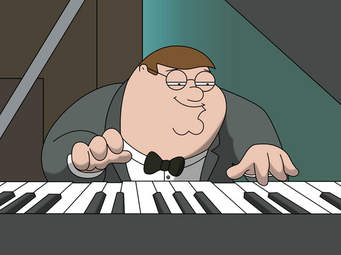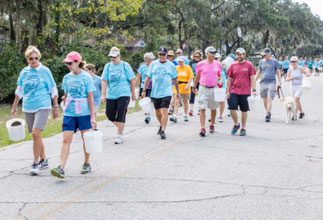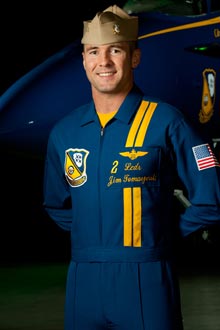 Editor Margaret Evans gets up close and personal – over the phone – with Lt. Cmdr. Jim Tomaszeski, one of America’s famed flying daredevils known as the Blue Angels.
Editor Margaret Evans gets up close and personal – over the phone – with Lt. Cmdr. Jim Tomaszeski, one of America’s famed flying daredevils known as the Blue Angels.
The Call
I’m sitting in my home office (i.e. breakfast nook), watching the clock, waiting for a phone call from Lieutenant Commander Jim Tomaszeski of the United States Navy. I’ve got my voice recorder all set, my list of incisive questions before me, and my cat in my lap. I am well prepared. And I am nervous. Lt. Cmdr. Tomaszeski isn’t just any old naval officer, you see. He’s a Blue Angel – a member of that super-elite squadron of Navy and Marine Corps flyboys who travel the country dazzling large audiences with their breathtaking audacity and spectacular skill. As far as I’m concerned, they’re the sharpest, bravest, coolest dudes this side of a movie screen. And I am a small town journalist, sitting in a breakfast nook, wearing pajamas and holding a cat. Thank goodness for phone interviews. Ours is scheduled for 2 pm.
The phone rings at 1:58. Naturally. These guys don’t miss a trick.
Margaret Evans: Tell me a little about yourself, Lt. Cmdr. Tomaszeski. Where did you grow up, go to school, etc?
Jim Tomaszeski: I grew up in Orange Park, FL, and graduated from Florida State University, where I was an English Major.
(This surprising detail is not lost on your humble interviewer, who was also an English Major. A bonding opportunity, perhaps?)
I’ve been in the Navy for 11 years, and have been flying airplanes for 10 and 1/2 of those years.
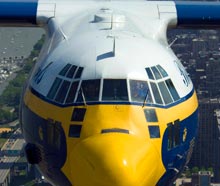 ME: As a little boy, did you dream of being a fighter pilot?
ME: As a little boy, did you dream of being a fighter pilot?
JT: My dad was a helicopter pilot, so flying was never a far-fetched notion to me. But when I was little, I think I was more interested in being Indiana Jones or a fireman or something. I guess I always kind of wanted the sense of adventure that military life offers.
ME: How hard is it to become a Blue Angel? Do you have to “audition”?
JT: It’s an interesting process. For the pilots, there’s no flying try-out. The pool of Navy and Marine Corps aviators is already pretty small, and frankly, if you’re not really good at what you do, you’re not allowed to fly these airplanes. By the time you’d apply to become a Blue Angel, you’d have generally had about eight years of experience flying with a squadron. That equates to a lot of hours in the air. We require 1250 jet hours; and that’s just to get your foot in the door.
Honestly, your reputation carries you a lot farther than anything on your resume. I’m the applications officer this year, and the questions we always have in mind are: Is this somebody you can get along with on the road for 320 days a year? Is this someone you can share a car with? That you won’t mind being stuck out in the desert with during training? We’re all average to above average pilots – hopefully we’re not below average! – so it’s really more about how you get along with the fleet. If you’re just out for yourself, you won’t get very far in the process.
ME: How many pilots try and fail to join your ranks?
JT: For 2012, we have three spots open. There are about 50 guys and three women trying out, which is pretty normal.
ME: Three women? That brings me to my next question. Are there – or have there ever been – any females pilots in the Blue Angels?
 JT: We haven’t had any female pilots… yet. We’ve had plenty of female officers, but no actual pilots. I think it’s just a matter of time. The odds are against you when you’re trying out to be a Blue Angel, no matter who you are. We had two women try out last year, and, as I said, there are three this year. Women in aviation are just a regular part of business in the Navy and Marine Corps, now… nothing all that different… so it’ll happen eventually, I’m sure. It’s really just a numbers thing…
JT: We haven’t had any female pilots… yet. We’ve had plenty of female officers, but no actual pilots. I think it’s just a matter of time. The odds are against you when you’re trying out to be a Blue Angel, no matter who you are. We had two women try out last year, and, as I said, there are three this year. Women in aviation are just a regular part of business in the Navy and Marine Corps, now… nothing all that different… so it’ll happen eventually, I’m sure. It’s really just a numbers thing…
(I sense that Lt. Cmdr. Tomaszeski is starting to sweat… )
ME: Don’t worry… I’m not going to get all feminist on you. I was just curious.
(Mutual laughter ensues.)
The Unexpected Interruption
Just when things are going very well – and I’m gearing up to ask a sensitive question – I hear a loud knock at my door. I can’t ignore whoever it is, because my door is glass, and whoever it is is looking right at me. There are two whoevers, actually – two handsome, clean-cut young men in dark pants, white shirts and ties. “Ma’am, we’d like to talk to you about a living prophet!” they yell through the glass. Mormons.
ME: Jim – may I call you Jim? – can you hold on just a sec? Somebody’s at my door.
JT: Sure. No problem.
I walk to the door, still holding the phone, and bellow through the glass, “I can’t do this right now. I’m working!” “Working?” they ask, perusing my pajamas and looking skeptical… for Mormons. “Yes! I’m interviewing a Blue Angel!” “A Blue Angel?” they repeat, loudly, looking puzzled. “Yes, a Blue Angel! I really cannot do this right now!” The Mormons don’t budge. (Surely they know it’s not that kind of angel?) “Ma’am,” they yell, “Do you know your neighbors?” I begin waving my hands (and the phone) frantically. I’ve got a Blue Angel holding, for crying out loud! “I seriously can’t do this right now,” I shout, turning my back on their eager young faces and returning to my desk in the breakfast nook. They leave, looking cheerful and undaunted – I see them through the glass, heading across the street – and I feel terrible. I’ve never screamed at a Mormon before. I hear Lt. Cmdr. Jim laughing over the phone. I assure him I’m not usually mean to Mormons. He’s very sympathetic.
The Heart of the Matter
ME: The Blue Angels lost a pilot here, back in 2007. Lt. Cmdr. Kevin J. Davis crashed his Hornet near the end of the Air Show over MCAS-Beaufort. I remember it like it was yesterday. Did you know him?
JT: I didn’t know him personally. At the time, I was applying to be a Blue Angel, and he was the applications officer, but I never actually met him.
ME: According to my research, 26 Blue Angels have been killed on the job (out of 262 pilots, as of 2007). That’s a 10% fatality rate. Did Lt. Cmdr. Davis’s death make you question your desire to join the Blue Angels?
JT: No, not really. If anything, it kind of reaffirmed my dedication to the mission of the Blue Angels, and what this squadron represents. As for that statistic, I don’t think anybody really dwells on it. When you sign up for the military, that possibility is always there.
ME: How big is the Blue Angels squadron? I have a feelings there’s far more to it than meets the eye.
 JT: Currently we have 16 officers assigned. But our entire squadron consists of 130 personnel, and like any aviation squadron, the backbone is our enlisted men and women. We’ve got the best maintainers you can imagine. Something that’s unique to the Blue Angels is that we get to pick our enlisted force. So we’ve got this large group of great and talented individuals who make these 25-year-old-plus airplanes run nearly flawlessly at air shows across the country.
JT: Currently we have 16 officers assigned. But our entire squadron consists of 130 personnel, and like any aviation squadron, the backbone is our enlisted men and women. We’ve got the best maintainers you can imagine. Something that’s unique to the Blue Angels is that we get to pick our enlisted force. So we’ve got this large group of great and talented individuals who make these 25-year-old-plus airplanes run nearly flawlessly at air shows across the country.
ME: Do you take them all with you on the road?
JT: We only take about 50 enlisted personnel to our shows. That’s about as many as we can fit into Fat Albert, our Marine Corps C-130 Logistical Aircraft. But they’re an important part of the show. They handle the ground show. Some of the most interesting places we go, I think, are in Middle America, where people aren’t as familiar with the military as you folks on the coast are. These people are getting to see just who it is that’s serving their country, sometimes for the first time. As for us pilots, we’re the Blue Angels – people expect us to be spectacular. What they don’t expect is the kindness and sharpness that our sailors and marines bring to their communities whenever they walk in. Not only are they just the best in the world at what they do, but they’re about the nicest bunch of people you’ll ever meet.
ME: I was thinking the same thing about military folks in general, recently. A few weeks ago, the Marine Corps Silent Drill Team came to perform at Parris Island here in Beaufort. We took our nine-year-old, and she was just mesmerized. Their precision – not to mention the sense of reverence and respect they radiate – are just awesome… so antithetical to almost anything else she’s exposed to in this culture. And when the show was over, the Marines were so warm and friendly… We were really impressed.
So, how important do you think the Blue Angels are to Navy and Marine Corps recruiting?
JT: Recruiting is our mission. I’m so glad you brought up the Silent Drill Team. They’re amazing! It’s
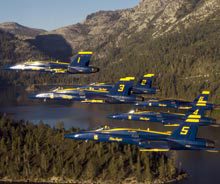 hard to imagine anybody watching them and not wanting to get a nice tight haircut and join the Marine Corps that very moment! They’re just so terrific at what they do. As for the Blue Angels, we’re probably the most visible representation of Naval and Marine Corps aviation out there. I’d like to think that we do it pretty well. It’s a 65-year legacy, and each team just hopes to take it on for one more year, and help inspire the next generation of military service members. For what it costs to run this squadron, we get a very big pay-off. And it’s certainly a lot more fiscally responsible than, say, taking the USS Enterprise up the Mississippi. (Laughs)
hard to imagine anybody watching them and not wanting to get a nice tight haircut and join the Marine Corps that very moment! They’re just so terrific at what they do. As for the Blue Angels, we’re probably the most visible representation of Naval and Marine Corps aviation out there. I’d like to think that we do it pretty well. It’s a 65-year legacy, and each team just hopes to take it on for one more year, and help inspire the next generation of military service members. For what it costs to run this squadron, we get a very big pay-off. And it’s certainly a lot more fiscally responsible than, say, taking the USS Enterprise up the Mississippi. (Laughs)
ME: Have you ever flown in combat, Jim?
JT: No, I was on the USS Kitty Hawk, and we had a different area of responsibility. We were mostly on the Sea of Japan.
ME: Well, I was going to ask you what’s scarier, flying in combat or flying in an air show… but I guess you can’t answer the question.
JT: (Laughing.) Flying in an air show is definitely exciting, but not scary. The stuff we do up there looks dangerous… but it’s really not. If any of us performed a maneuver we were uncomfortable with… well, frankly, we just wouldn’t. It’s a show. It’s just a show.
ME: But it looks absolutely terrifying!
JT: The things that look super-dangerous are things that every naval and Marine Corps aviator does on a daily basis. The maneuver that probably looks the most dangerous is when we point at the ground, then pull up at the last minute without hitting it. It’s a very exciting thing to watch – it appears that we’re barely going to miss the ground. But, seriously, that’s what we do every day in training.
ME: Are you kidding me?! So, your heart’s not pounding every time you do that?
JT: (Laughs.) Well, it’s a workout, flying these airplanes. So my heart’s pounding. But it’s the thrill of making the next maneuver happen, not fear. We have just over 35 different maneuvers, on a good day. On a beautiful day, we do what we call the “high show.” Basically, I’m always just focused on the next maneuver. And if I screw that one up, I just have to flush it and focus on the next one. We debrief after every show… watch the whole thing on video. We critique every little nuance in HD, including how well we turned the smoke on and off. (Laughs) We’re very hard on ourselves, always seeking the absolute perfect air show. But it’s not so much about the show as about representing the personnel who are putting themselves in harm’s way, doing what they need to do to get the job done every day… just being absolute professionals. We try to be worthy of them.
ME: How do you prepare, mentally and emotionally, before an air show? Do you have a prayer that you say, or a group cheer… or something?
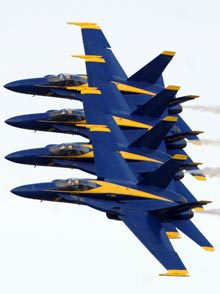 JT: Um, we definitely do not do a cheer. But I’ll be sure to bring it up with the team. (Laughs.) No, we have a very straightforward routine. It’s been around for some time. We try to keep everything exactly the same. Our ritual is to show up about an hour prior to brief time, look over the imagery, look over any tape footage from practice the day before, and talk through all the maneuvers we’re about to do. That’s all before the briefing process. For the briefing, we’ll split up into our elements – I’m part of Delta, the six F-18s that make up the diamond formation – and we’ll actually do a thing called “chair flying.” It’s as simple as it sounds. You sit in a chair and pretend you’re flying around. With our eyes closed, we’ll go through most of our maneuvers, with all the calm and muscle memory. That, hopefully, will get the rust off if you’re having any trouble with a particular maneuver. When that’s all done, we have about 10 minutes – to get a drink of water, use the bathroom, etc. – and then the air show’s on. We take a van out to the jets, shake the hands of all the maintainers that are out there, and do the military walk down in the manner that folks are expecting.
JT: Um, we definitely do not do a cheer. But I’ll be sure to bring it up with the team. (Laughs.) No, we have a very straightforward routine. It’s been around for some time. We try to keep everything exactly the same. Our ritual is to show up about an hour prior to brief time, look over the imagery, look over any tape footage from practice the day before, and talk through all the maneuvers we’re about to do. That’s all before the briefing process. For the briefing, we’ll split up into our elements – I’m part of Delta, the six F-18s that make up the diamond formation – and we’ll actually do a thing called “chair flying.” It’s as simple as it sounds. You sit in a chair and pretend you’re flying around. With our eyes closed, we’ll go through most of our maneuvers, with all the calm and muscle memory. That, hopefully, will get the rust off if you’re having any trouble with a particular maneuver. When that’s all done, we have about 10 minutes – to get a drink of water, use the bathroom, etc. – and then the air show’s on. We take a van out to the jets, shake the hands of all the maintainers that are out there, and do the military walk down in the manner that folks are expecting.
ME: I still think a cheer would be nice. But anyway… Do you ever get nervous before a show?
JT: Not about the flying. There are definitely shows where you want to do well. Maybe your parents are in the audience, or something. President Bush, Sr. was at a show last year, and I know I wanted to do especially well for that. And on Thursdays before an air show, we often meet with Make-a-Wish kids after our practice. So you really want that practice to be great.
ME: It must be wonderful getting to be a hero to children…
JT: You know, that’s definitely one of the best parts of the job. In fact, I have this letter here, from Joseph (age 6) and his sister Sarah (age 4), that I just got today. I have an 18–month-old son, and he’s not writing just yet, but this letter is written on that old paper you practice your upper and lower case letters on – you know, with the dash lines? – and Sarah here wants me to know that she likes princesses and Tinkerbell. She also wants to know what flies faster, jets or fairies? How great is that?! This stuff doesn’t happen anywhere else! So, of course I’m gonna write her back and tell her that jets fly much faster than fairies…
ME: You’ll make her day! You know, you guys aren’t just heroes to children. I posted on Facebook that I was interviewing a Blue Angel today, and you should have seen the comments! Everybody was green with envy – both men and women!
JT: It’s very neat and such a privilege, because you’re really part of something that’s bigger than yourself. I get to wear this tight blue uniform that probably looks pretty good when I’m climbing into my plane… but it looks a little silly when I’m driving to work in my mini-van. (Laughs.) I’m always very much aware that this is just a short, short time in an otherwise very normal military career.
ME: Okay, Officer Humble. Whatever you say. I really appreciate the time you’ve given me today. It’s been great fun. I hope to meet you when you’re in Beaufort.
JT: Thanks, Margaret. I’ve enjoyed it, too. Now go track down those Mormons.
ME: I hope they’re still in the neighborhood! Thanks, again… and don’t forget to run that cheer idea by the team…
The Blue Angels will perform on Saturday, April 30th and Sunday, May 1st at the Beaufort Air Show. For a full schedule of events, visit www.beaufortairshow.com

